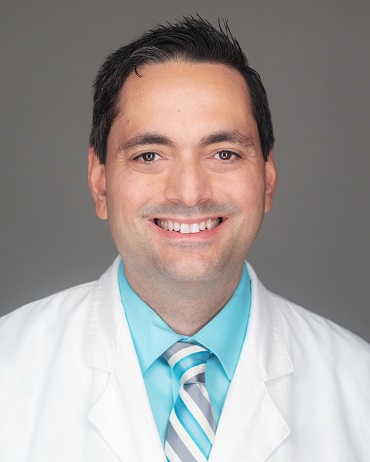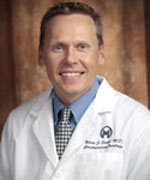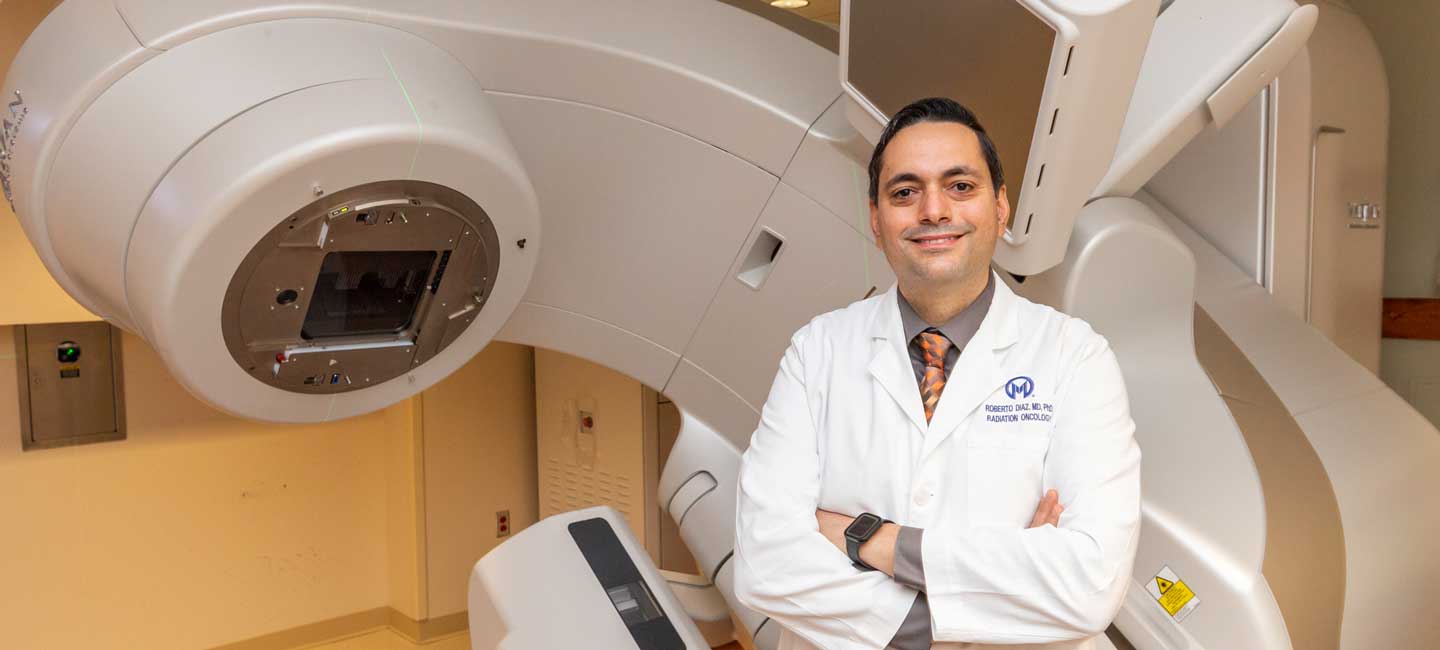Roberto Diaz Celebrates Five Years Free of Kidney Cancer
January 2016 was perhaps the most eventful month of Dr. Roberto Diaz’s life.
The section head for Breast Oncology in the Department of Radiation Oncology at Moffitt Cancer Center was a father of four at the time. On New Year’s Day that year, Diaz’s wife surprised him with the news that their fifth child was on the way. That news wasn’t the only cause for celebration as Diaz was two short weeks away from leaving for a medical mission’s conference that would give him the chance to combine his faith with his desire to heal. Three days before that trip Diaz took his family out for dinner. At the time it felt like a typical Tuesday night. What happened after the meal was anything but typical.
“I was watching TV with my kids,” Diaz said. “I had two on the side and one on top of me. Then all of a sudden, I felt a very sharp pain in my abdomen. I was thinking this is very likely to be gallstones. I had to stand up and it hit me like, ‘wow!’ ”
The pain persisted to the next morning. Diaz recalled some uneasiness while swallowing, but knew he was scheduled to be in clinic at 6:30 that morning so he took some ibuprofen and headed to work. By noon it was clear something was wrong. Others around him had started to notice his pain.
“One of the breast surgeons, Dr. Khakpour, called me to ask if I wanted to see an add-on patient. I said ‘no’ probably for the first time ever because I wasn’t feeling well. When I explained to Dr. Khakpour what was going on, she asked if I wanted to be seen by someone. In my mind I knew I had a gallstone, so I asked for a surgical recommendation. She suggested a gastrointestinal physician, and I said, ‘no I don’t have cancer, I have gallstones. I can feel it, it’s gallstones.’ ” Khakpour was able to convince him to be seen in-house.

Diaz had an abdominal ultrasound performed and his initial instincts appeared to be right. There was evidence that he likely passed a gallstone. There was more lurking in the ultrasound, however. Diaz was surprised to learn that the imaging included his entire right side, not just his gallbladder. Had Diaz had the imaging done somewhere other than a cancer center, doctors likely wouldn’t have looked at his kidney, where a 5-centimeter tumor was found.
“All of a sudden I’m told, ‘you have kidney cancer.’ I couldn’t grasp it,” said Diaz. The diagnosis was stage I renal cell carcinoma. “It was out of nowhere. The doctor wanted to get a CT scan to check to make sure it didn’t spread. That’s when it got real to me.”
Up until that point Diaz had spent years studying and practicing medicine. He earned his MS, PhD, and MD degrees from New York University School of Medicine, spent his first year of residency in Internal Medicine at Yale University’s Griffin Hospital and completed his training in Radiation Oncology at Vanderbilt University before eventually landing at Moffitt Cancer Center.
For the first time in his decadeslong career he found himself on the receiving end of that phone call. Suddenly he wasn’t the doctor anymore. He was now a cancer patient. The medical missions conference was no longer on his schedule. Instead, a surgery to remove part of his kidney took its place.
Dr. Wade Sexton is a senior member in the Department of Genitourinary Oncology at Moffitt. He worked with Diaz to come up with a plan for surgery and the ensuing monitoring of the disease.
“When a physician is diagnosed with a malignancy, particularly a cancer surgeon or a cancer physician, the natural tendency is to think about all of the worst scenarios that you’ve encountered and it generates a lot of fear and anxiety and you’re suddenly living the life of your patient,” said Sexton. “It really hits home when it’s somebody you’re close to, somebody you’re familiar with, or somebody with whom you’re working alongside.”
The day before his surgery, Diaz felt a sense of eeriness. He found himself performing an intraoperative radiation therapy surgery in the room next to where he’d be the one going under the knife in less than 24 hours. Diaz and Sexton thought the diagnosis was stage I based on the size and placement of the tumor.
The day of the surgery, the plan was for Sexton to perform a partial nephrectomy, or removal, at the bottom of Diaz’s kidney. That plan quickly changed when the tumor was deeper than they initially thought. Sexton removed Diaz’s entire right kidney.
“I go into surgery with a stage I diagnosis,” said Diaz. “Then all of a sudden after the pathology report I’m at stage III. What other disease site do you have stage III cancer and the only thing we can do is surgery? There’s no chemo. There’s no radiation. No clinical trials I was eligible for. There’s nothing to do besides watch it.”
Diaz was 41 at the time of his surgery. On average, many kidney cancer patients aren’t diagnosed until their 60s. “Here I am thinking, my goodness, if I didn’t pay attention to my body about the gallstone, I would not have made it to my 50th birthday.” It was particularly at this time that his Christian faith gave him peace and hope with his diagnosis. Many nights were spent in prayer with his wife. Could he live at peace, trusting that his children would be OK without him? Absolutely.
Fast forward five years and Diaz is now 46 years old with five children and cancer free. For five years the ensuing scans have given him five consecutive clean bills of health. Until this point, he had never publicly shared his cancer journey as a patient. So why now?

“It’s been five years,” said Diaz. “It’s the excitement of what reaching that milestone in cancer means. I see patients who are in worse situations than me. I see their courage and how they fight and then keep fighting. I can relate more than they know. The anxiety that comes with waiting for scans, they call ‘scanxiety.’ I can relate to that because it’s real.”
Each year when Diaz goes for his annual scans, Sexton feels that same ‘scanxiety’ with him. At the end of the day Sexton knows that Diaz is now a better doctor for having gone through the cancer journey as a patient.
“Roberto is going to impact lives in a way that he would not have been able to before his diagnosis,” said Sexton. “Not only does he possess medical expertise and technical ability, but now he’s able to share a personal experience that will help him connect with a patient in a much greater way. He’s blessed to be a survivor, and he’s going to impact many more lives because of it.”



